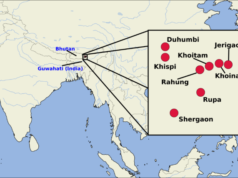How people of different nationalities work together depends on their preconceptions.Image credit: ©stemonx/Flickr
Germans arrive at every appointment 5 hours before the scheduled time, all Indians are called Ranjid and have a red mark on their foreheads, the Japanese bow 10,000 times a day, and Americans all speak with chewing gum in their mouths. The list of stereotypes can be as long as you wish, and every country has its own prejudices about other cultures. These are meant to help with a quick appraisal of the people we are dealing with. The influence of clichés about people from different nations on the willingness to cooperate with one another was the subject of an investigation by Angela Rachael Dorrough and Andreas Glöckner from the Max Planck Institute for Research on Collective Goods focusing on six different countries. Their work revealed that expectations, which are often influenced by strong cross-societal clichés, play an important role.
In an increasingly globalized world, establishing successful cooperation between people from different nations is becoming more and more important. “Nowadays, it’s common to talk with someone on the phone or interact with people from all over the world without knowing anything about them other than their nationality,” says Dorrough. “Here, the usual economic theories often neglect to take psychological and cultural aspects into consideration.”
The Max Planck researchers wanted to find out how the participants of various nations behave when they interact with one another. For their study, they invited 1,200 people from Germany, India, Israel, Japan, Mexico and the US to take part in an online game with one another. The willingness of the players to share and collaborate can be investigated with the scientific study of this prisoner dilemma game. The participants, who cannot make any arrangements with one another, must decide on whether their behaviour is going to be selfish or cooperative for the game. If both opt for selfish behaviour, they both get nothing. If both decide to cooperate and share, then there is a medium-level gain for both. If only one of the two behaves selfishly, he or she will get the lion’s share and the other will be exploited to the maximum.
The prisoner dilemma – in an international context
The dilemma lies in not knowing what the other person will do. So the partners have to try and assess the behaviour of the other. If a player thinks their partner will behave selfishly, then they will likewise choose selfish behaviour. If a player judges their partner to be cooperative, then they will also choose to cooperate. In the game, which was played just once, the only thing the player knew about the other was their nationality. Besides making a cooperation decision, participants also indicated their expectation regarding their current interaction partner`s cooperation. To learn more about how the participants formed their expectations, they were subsequently asked about how they assessed their co-players – namely on the basis of criteria for assuming a willingness to cooperate: trustworthy, friendly, generous or likeable. In order that the researchers could look in greater detail at a country that rated poorly in the assessment of willingness to cooperate, they also asked the participants about other characteristics. For example, the participants had to specify how attractive, spiritual, sociable, sporty and wealthy they considered the others to be.
Find your dream job in the space industry. Check our Space Job Board »
Opposing expectations
The study revealed that the players hold strong beliefs that are influenced by nation-specific clichés about the behaviour of their co-players. A prior study by the researchers had already shown how differently US Americans assess the willingness to cooperate of partners from other countries. For example, they expect a high degree of willingness from the Japanese, but a very low level of willingness from Israelis or Indians. Paradoxically, people from Israel assume a very high level of cooperation from partners in the US and cooperate for their part. The Japanese are essentially more pessimistic about the cooperative behaviour of other nationalities; Germany ranks at an average level in this regard for the Japanese.
The participants thus behave according to stereotypes, even though these ultimately prove to be false and actually correlate negatively with reality. This prompted the researchers to compare the expected contributions with the actual results. Participants, for instance, often expect very cooperative behaviour from the Japanese in the test, which ultimately isn’t the case – most likely because the Japanese do not expect a great deal of cooperation from others. These stereotypes have a negative effect on the Israelis – a lower level of willingness to cooperate is generally expected from them, even though they are fully prepared to share.
“There can often be some truth in stereotypes, but if we unjustly judge people wrongly, then our responses are also wrong. This alone should make us more aware,” says Dorrough. However, we don’t always manage to do this. “This would be an objective of research – that is, to find out how we could help counteract these erroneous assumptions.”
Yet, it is not just clichés that influence behaviour. The players also have different social preferences. For example, they prefer co-players from their own country or towards people from poorer countries. Players from Mexico and India get more than what was expected by them. No connection was found in the spatial distance between the nations.
The researchers want to refine their results in the future by including more countries. They also want to study how the degree of globalization or historical factors can explain certain behaviour.
Source: Max Planck Society
Research References:
- Angela Rachael Dorrough et al. Multinational investigation of cross-societal cooperation, Proceedings of the National Academy of Sciences (2016). DOI: 10.1073/pnas.1601294113











